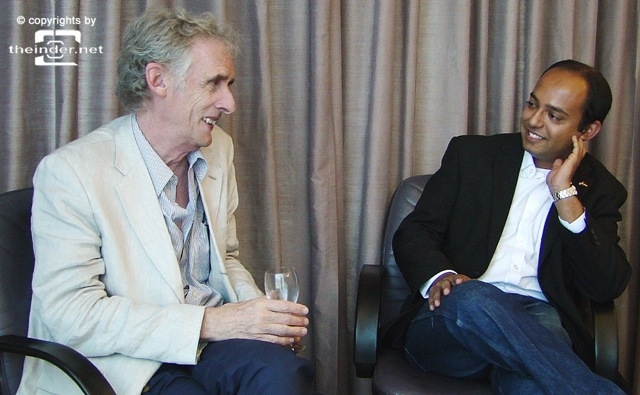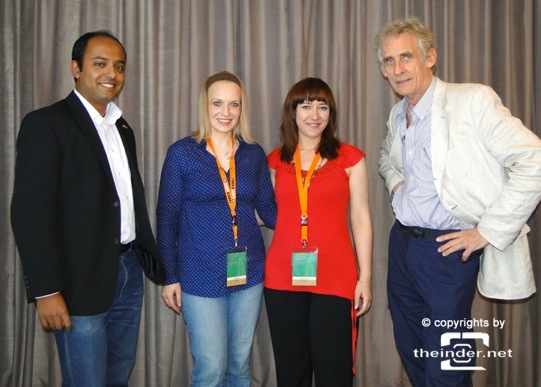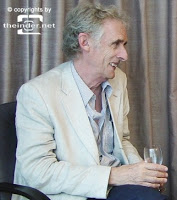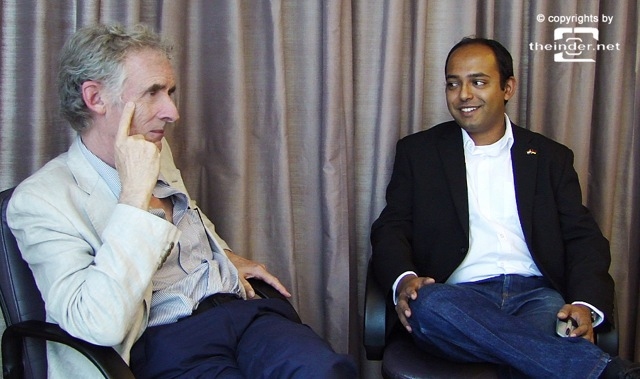No, never (laughs) I liked the Connery Bond films. I enjoyed working with Pierce (Anm. d. Red.: Pierce Brosnan). The time when I was an editor, I did not think about that one day I will do studio films and bigger American films. I am lucky that I had the chance. I also had a great time with Tom Hanks. But the films I really wanted to make were difficult, more European kind of films.
No. Now I am not doing any studio films, since 10 years already. I have several films which I want to make. What I am about to make here, another one will be probably in Berlin or Munich about the Second World War and I have another about the Second World War about a train with Jewish who are segregated in Hungary. I want to cast the train and it is an extraordinary wonderful story. And there is an another production. At the moment I am doing a fascinating film in India about an Indian mathematician, Ramanujan. The story plays in Madras, 100 years ago. The most brilliant mathematician of the last century probably.
A friend of mine, a writer, wrote a play about this Indian mathematician 10 years ago. And he was sending his scripts to me and I was sending him my scripts, we exchanged them to each other. It was actually hard to find the right people. He had a very big cast and I suggested him 5 or 6 years ago that why didn’t he try a screenplay. And then we did the same process and eventually he made a very beautiful script. And of course nobody wanted to see a film about a mathematician; it was very hard to find the right people. Probably nobody understands the mathematics. At the end we found two young guys in Mumbai who created a little film fund to make films for social purpose and they tried to make it work. The film is set 100 years ago in India and half a bit in England, so it is not the same price to produce it of course like Indian films, it is more expensive. It is like the movie „The King’s speech“ (2010), that kind of film and that kind of price. So it is more difficult to finance it. But the movie is headed for release next year in 2012 and it will be called „A First Class Man“ (2012), a part of it is in Trinity Cambridge. This man went and worked in Trinity Cambridge for four years, from 1914 till 1918.
That is right. It is about a friendship. It is a very beautiful story because there was Ramanujan. Nobody could understand his work. He is 26. By the way he was 26 or 27, when he was thrown out of university. He was a Brahmin, but very, very poor – a Tamil Brahmin from a very poor home. And he worked all day on a slate where he wrote down formulas. Occasionally he wrote down in a notebook but he had no money to buy a notebook. And people who looked in this formulas, they could not make any sense out of this. One or two people started to wonder that there must be something in it, but they were not sure. Eventually somebody helped him, copied these notebooks three times, parts of it, only few pages, and they were sent to three great mathematicians to England. Two of them said ‘This is rubbish, this man is just a crazy person.’ They had no interest at all. And the third one said ‘He is either a crazy person or the greatest genius of our age.’ And they talked to Cambridge, to Trinity, to bring him to England and within a couple of days they realized that he was an extraordinary genius. Because actually you could read what he was writing, but he had a very strange imagination. First of all he was deeply religious and he believed that his god has given him the answers. He just knew things. He never could work out a formula start with ‘a’ plus ‘b’ plus ‘c’ and developing it to an extraordinary thing at the end. He would jump to ‘z’ and he would not write down what was in between ‘a’ and ‘z’. But the Englishman who was a total atheist and believed only in cricket, in cricket and mathematics. Not in god or anything. He understood and liked that extraordinary genius and accepted that he had his god. And he would become the person who helped to discover the true things and he went from being the most famous mathematician in Europe partly, to be a man saying that ‘My greatest contribution that I made Ramanujan and helped him.’ So it was a very interesting and graceful relationship and they became great friends. But the British – I can say this because I am a little bit English (laughing) – they didn’t know how to look after him. They did not understand Vegetarian, only English food.

And then the war started and Ramanujan who came probably for few months to meet people who could understand him, he couldn’t go back. Because all shipments were stopped, some ships sank and the war started. So he was stuck in England for four years. During that time he was freezing, because he had no coats, he never got comfortably dressed. So he very quickly had TB (Anm. d. Red.: Tuberculosis) and he died. And he produced 3,400 of the most ordinary formulas. Some of them are still worked out now, some were used in a string series 20 years ago and he was a man who worked without computers. He created formulas that which are now often generated out of computers and understood through computers and then worked out. So he had this remarkable grace and humanity and humor and this great function with this English colleague. That’s the story.
In one of the last movie you directed was „The children of Huang Shi“ in 2008 (in German: “Die Kinder der Seidenstrasse”, 2008). The shootings were done in China as well. In which sense does China or the Asian countries fascinate you personally?
I found it an interesting story. I was actually lucky about the story. About 10 to 12 years ago I came across the true story about an Englishman – George Hogg. He wanted to be a journalist and go to China. He was about 26 and somehow he gets to Shanghai and the Japanese are there. And this was a piece of history that not much is known about. It was in the end of 1930s where Japan invaded China and this was a terrible event as bad as in Europe but the Western world was not aware of this. I think 10 million people were murdered by the Japanese. And George Hogg was injured and he ended up working in a strange orphanage of young children. And like it happened in other stories of China when the Japanese army got close, he knew that the children will not survive. And he walked with the school of children – they were about 60 I think, between the age of 5 and 15 – he walked about 1,000 km across China to stay ahead of the Japanese. And they all survived. He died soon after. And two-third of these survivors is still alive and also through this war they got educated somehow. Some of them have been to prisons but though they became educated people, they survived the war and every year they meet where he died and they all go there. They take long train rides and they honor this man. This is an interesting story. We worked on this script and the production was in Australia and China, we made a coproduction, it is officially an Australian-Chinese film. It was finished here in Germany, not in Stuttgart, but in Dortmund, Düsseldorf and Berlin with very helpful collaboration of all these companies and funds. And it is rather a beautiful fund and we had this great cast with this Chinese crew.
Soon after shooting this film I went to Kerala for the first time and I fell in love with India. There are millions of Indians in London and I love that food and everything. But to go from China [… ] to India was a change. India has this wonderful past, they worship women, there are beautiful women. You find people smiling and laughing and there is humor and that’s beautiful, funny and great. […] India is a completely different world than China. They each have similar problems, but in India you feel this kind of extraordinary culture of which they are proud of.
 |
| theinder.net correspondents Tomal K. Ganguly, Birgit Opitz and Marta Nowicki (left, middle, right) together with Roger Spottiswoode |
Hollywood and Bollywood are two different worlds. The main idea of the industry is the same, but though Bollywood is the biggest film industry in the meanwhile. Why do you think that Bollywood is so famous?
It makes popular culture. There are millions of people. And Hollywood is doing the same but is in this sense second. Bollywood is very successful. They have got the language, the cinema language with the dancing and the stories and so on. They modernized traditional story telling in a way that shows things what the audience wants. And they made it to media, very effective in their role. But both industries are similar in many, many ways. And all of them are looking for huger markets and big co-operations and of course they will become worse and worse. They will become more and more cookie-cutters. Because here in Stuttgart, it is Bollywood and beyond and I saw lots of films which are not cookie-cutter films which were very Indian and very terrific. Some of them have great music and some of them have dancing. But they were also traditional, Satyajit Ray traditional, beautiful, intelligent and interesting or being Indian or being Indian and Jewish at the same time. There are all sorts of interesting and complicated stories which I have seen at this festival. You must be seeing this for seven years now that it is not only Bollywood but also exists alongside of Bollywood. And I hope that they will find a more bigger audience for this.
Can you describe Bollywood in just three words?
(laughing) Brash, energetic and beautiful!
Have you watched any current Bollywood movies lately? If yes, what was your favorite one?
No (laughs). I don’t like American musicals, I don’t like musicals. I love music but I don’t love musicals.
So you are comparing Bollywood films with musicals?
That’s all I know. I love Indian films like more traditional. There are Czech films, Polish films or French films. Of course they are not Indian, but they have universal themes. Their act is worked in a same kind of traditional, emotions are hidden, it is very realistic, it very naturalistic. These are films I love. But I know Bollywood is great. I like the other cinema. For example the cinema which is celebrated here in Stuttgart. And there were great films which I saw and there are more films to see.
Have you ever involved or do you plan to involve any Indian actresses in your productions?
(laughs) You have lots of wonderful actresses. I don’t have the script at the moment, but one day I will. We don’t have female mathematicians in our current film because we did like how it really happened. But there are several Indian characters in that film. There not enough good parts for a ‘Bollywood star’ (laughs again).
You are invited as a jury member to this year’s festival. What is your opinion so far about the films which have been shown?
Till now I have just seen eight films but it is my pleasure to see many, many more. And then you are asked to pick one out of them. There is also the audience award. That is a hard one, because people don’t always remember to vote, but they do their best. The audience is also working incredibly hard. It is great to be here and I think that’s a nice thing. And also the awards are a nice-to-have beside the festival. But then there are many films you can’t give awards to, you have to give one and you think you should have awarded that movie as well. Many of the movies should get an award and there are the rules. That’s life (laughs).
As a famous film producer, which one advice would you give to the upcoming film producers and actors here who are heading for Hollywood or either Bollywood?
You should always do in what you believe in. It is never good making films if you think that you are doing it only for a big audience or you think to make money. You have to make things in which you believe in and care about and stay true to yourself. You should be really passionate.
Thank you very much for your time. Enjoy your stay!
Thank you, too.
Fotos: Birgit van Art – Photodesign













